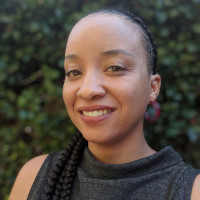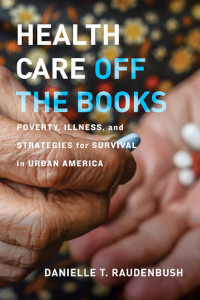 Health Care Off the Books
Health Care Off the Books
Understanding informal strategies for getting care
By Sara Bock
Recognizing that millions of low-income African Americans in the U.S. live without access to healthcare, Danielle Raudenbush, an associate professor of sociology in the School of Social Sciences at UC San Diego, spent more than three years conducting fieldwork in a public housing development working to understand the “informal strategies” members of this demographic turn to in order to access essentials like pharmaceutical drugs and medical equipment when standard healthcare is not available to them.
Her findings, which frame healthcare in the U.S. as a formal-informal hybrid system, offer key insights into the sources of disparities in health outcomes and became the basis for her book, “Health Care Off the Books: Poverty, Illness and Strategies for Survival in Urban America,” published by University of California Press in 2020.
“From population-level research, we know that on one level people belonging to that group face greater obstacles to accessing healthcare. We also know that they also have much higher rates of lots of different health problems. But we have this unanswered question, which is if they’re sick and they’re not able to access care, then what are they doing?” said Raudenbush. “So, the underlying question is, in the face of these challenges, how is the healthcare system functioning for this population?”
 Now, she’s applying that same question to research right here in San Diego, investigating the effect that life in the border region has on the healthcare experiences of Mexican immigrants. So far, she’s found that those who are lawfully present and can cross back and forth across the border are strategically combining healthcare services in the U.S. and Mexico. In many cases, they choose to cross the border because of a dissatisfying experience in the U.S., and because care in Mexico is cheaper and more patient oriented. She sees this alternative option as a source of empowerment.
Now, she’s applying that same question to research right here in San Diego, investigating the effect that life in the border region has on the healthcare experiences of Mexican immigrants. So far, she’s found that those who are lawfully present and can cross back and forth across the border are strategically combining healthcare services in the U.S. and Mexico. In many cases, they choose to cross the border because of a dissatisfying experience in the U.S., and because care in Mexico is cheaper and more patient oriented. She sees this alternative option as a source of empowerment.
“There’s this kind of subgroup of people who are integrated in the U.S. healthcare system; they have insurance, they have what we call a usual source of care, so they have a clinic they go to or they have a primary care doctor, and yet they still at times go to Mexico for health services,” said Raudenbush.
Raudenbush, who comes from a mixed-race background, says that her exposure to both a primarily white upper-middle-class world and a primarily Black working-class world from a young age drove her to understand why disparities exist among certain populations. Health, she says, is fundamental to every aspect of people’s lives.
“That is why I’m driven to do this,” said Raudenbush. “I think until we really understand the roots of health inequality, until we really understand how people are getting care, or are not getting care, or the informal strategies they’re using, we won’t be able to effectively address these problems.”
Excerpted from UC San Diego Today. For the full story about how researchers across UC San Diego are working to understand health disparities – and solve them, please see Leading the Way to Health Equity."
